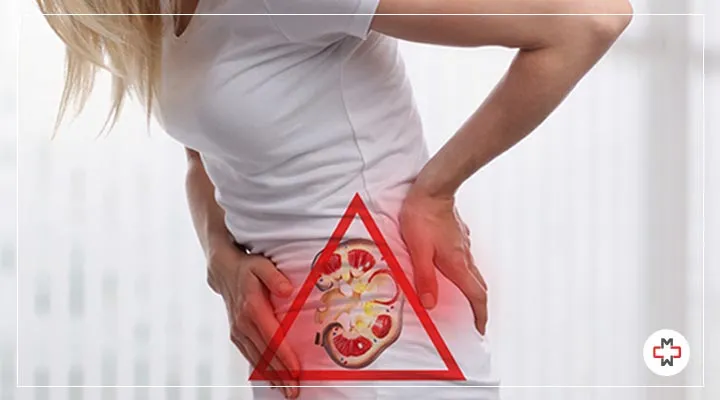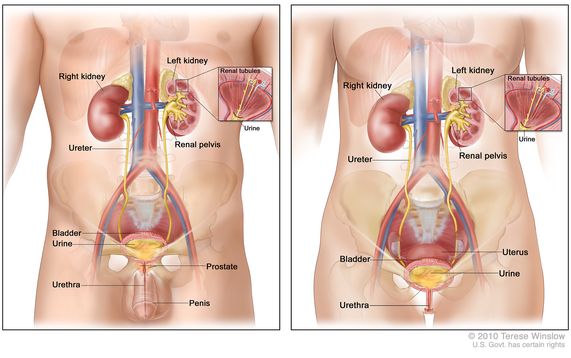Kidney Stones vs UTI: Understanding the Overlapping Symptoms and Treatment Strategies
Kidney Stones vs UTI: Understanding the Overlapping Symptoms and Treatment Strategies
Blog Article
Exploring the Effects and Causes of Kidney Stones in Contrast to Urinary Tract Infections: A Thorough Guide
The exploration of kidney stones and urinary system infections (UTIs) discloses a complex interplay of signs and underlying causes that require mindful examination. While both conditions can lead to hematuria, they present distinct scientific features and arise from various etiological aspects. Comprehending the subtleties of each problem is crucial for reliable diagnosis and administration. What are the key distinctions in their symptoms, and just how might these notify treatment approaches? The solution to these questions may give vital insights into the avoidance and care of these typical urological problems.
Review of Kidney Stones
Kidney rocks, likewise called kidney calculi, kind when particular substances in the urine crystallize and aggregate, resulting in the advancement of tough down payments within the kidneys. These rocks can differ in size, varying from a grain of sand to a golf ball, and can be composed of various products, the most common being calcium oxalate, uric acid, struvite, and cystine. The formation of kidney stones is affected by several aspects, consisting of dietary habits, fluid consumption, and hereditary tendency.
Signs and symptoms of kidney stones might include severe discomfort in the back or side, blood in the pee, nausea or vomiting, and regular peeing, specifically as the rock moves with the urinary system system. Medical diagnosis typically includes imaging research studies such as ultrasound or CT scans, together with urinalysis to identify the stone's make-up.
Therapy choices vary based on the size and kind of rock, in addition to the extent of symptoms (Kidney Stones vs UTI). Tiny stones may pass naturally with raised liquid intake, while bigger rocks might require medical interventions such as lithotripsy or medical elimination. Comprehending the pathophysiology and threat variables connected with kidney rocks is essential for effective avoidance and administration
Introduction of Urinary Tract Infections
Urinary system tract infections (UTIs) are usual bacterial infections that impact any type of part of the urinary system, including the kidneys, ureters, bladder, and urethra. They mostly take place when microorganisms, typically from the gastrointestinal system, get in the urinary system, leading to swelling and infection.
The prevalence of UTIs is notably greater in ladies than males, mainly as a result of anatomical distinctions, such as a much shorter urethra. Threat elements consist of sex, certain contraceptive techniques, urinary system retention, and dehydration. The medical diagnosis of UTIs is typically verified via pee tests, which might expose the existence of microorganisms, leukocyte, or red blood cells.

Signs And Symptoms of Kidney Stones
The pain related to kidney rocks can show up in various means, frequently leading individuals to look for medical attention. One of the most usual signs and symptoms is severe discomfort, normally localized in the reduced back or side, which might radiate to the abdominal area or groin. This discomfort, usually referred to as sharp or cramping, can occur unexpectedly and might fluctuate in intensity.
Furthermore, individuals may experience hematuria, or blood in the pee, which can vary from tiny total up to visible discoloration. This symptom might be accompanied by modifications in urinary routines, such as increased regularity or urgency, Home Page along with discomfort throughout urination. Nausea and throwing up are also prevalent, often resulting from the body's reaction to extreme pain.
Sometimes, individuals may experience high temperature and cools, especially if an additional infection develops as a result of the obstruction brought on by the rocks. On the whole, the mix of serious discomfort, hematuria, modified urinary system patterns, and intestinal symptoms can supply considerable understanding right into the visibility of kidney stones, warranting prompt medical examination and treatment. Comprehending these symptoms is vital for timely diagnosis and effective monitoring of the problem.
Signs of Urinary System Tract Infections
Infections within the urinary tract typically provide a series of distinctive signs and symptoms that can significantly affect every day life. One of the most typical symptoms consist of a persistent impulse to pee, commonly accompanied by a burning feeling throughout peeing, referred to as dysuria. Individuals might likewise experience increased regularity of urination, producing little amounts of urine each time.
Various other noteworthy signs and symptoms consist of reeky or gloomy urine, which might indicate the presence of microorganisms or pus. Sometimes, pee may show up pink or red because of the existence of blood, a problem referred to as hematuria. Additionally, people may experience pelvic pain or stress, which can better aggravate the feeling of seriousness.
Systemic signs may also show up, such as fever, cools, and tiredness, especially if the infection has actually ascended to the kidneys. It is important to recognize these symptoms early, as without treatment urinary tract infections can lead to much more extreme issues. Kidney Stones vs UTI. Motivate clinical interest is encouraged when these signs and symptoms are observed, permitting proper analysis assessment and therapy to relieve pain and avoid additional health and wellness problems
Root Causes Of Each Condition
Often, kidney rocks and urinary tract infections emerge from distinctive yet in some cases overlapping causes that can affect individuals in a different way. Kidney stones usually form due to metabolic factors, nutritional selections, and genetic tendencies. Enhanced levels of calcium, oxalate, or uric acid in the pee can cause rock development. Dehydration, inadequate fluid consumption, and high-sodium diet regimens can intensify these problems, advertising crystallization within the urinary tract.

Understanding these unique causes is crucial for avoidance and treatment. Kidney Stones vs UTI. While lifestyle adjustments might mitigate the threat of kidney rocks, ideal hygiene and timely therapy of urinary tract infections are essential for lowering their reappearance and connected complications
Verdict
In recap, kidney stones and urinary system system infections present unique signs and underlying reasons. Kidney rocks are identified by extreme discomfort and metabolic factors, while urinary tract infections mainly entail microbial infections causing urinary system necessity and discomfort. Although both problems recommended you read can cause hematuria, their formation devices differ significantly. Recognizing these differences is essential for reliable diagnosis and therapy, eventually boosting patient outcomes for those affected by either problem.
The exploration of kidney stones and urinary system system infections (UTIs) reveals a complicated interaction of symptoms and underlying causes that necessitate careful assessment.Urinary system tract infections (UTIs) are typical microbial infections that influence any component of the urinary system, consisting of the kidneys, ureters, bladder, and urethra.Frequently, kidney stones and urinary system system infections arise from unique yet occasionally overlapping causes that can affect individuals in different ways.In recap, kidney stones and urinary tract infections existing distinctive signs and symptoms and underlying causes. Kidney rocks are identified by extreme discomfort and metabolic factors, while urinary tract infections mainly include microbial infections leading to urinary system necessity and pain.
Report this page